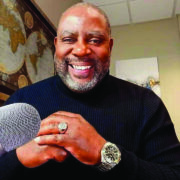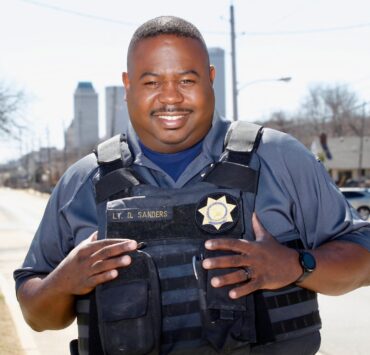918 SERIES
This week we feature a conversation between Eagle Editor Gary Lee and the duo of Charles Harper and Demali Wilson. Both are leaders of World Won Development, the community-oriented branch of North Tulsa’s World Won Church. Harper is Executive Director of the organization; Wilson is Executive Director of Operations. As co-hosts of the popular weekly Wednesday afternoon NewsUCanUse program on KBOB radio, the duo regularly covers public events all over North Tulsa. They also represent Black Wall Street in Black gatherings across the country.
The Oklahoma Eagle Staff
The Oklahoma Eagle
PHOTO
Provided
1. What’s the brightest aspect of North Tulsa?
Wilson: Its heritage and its potential. Coming from this community, I know what it used to look like, and I know we have the potential to do it even grander than we did it before.
Harper: North Tulsa is the epitome of potential. It has been there and done that. We’re just trying to do it again. When I look at the community, it has something that nobody in the country has ever had: a spectacular record of achievement and success.
2. What do people who’ve never been to Tulsa misunderstand about the Black community here?
Wilson: People who have heard of Black Wall Street but never been here believe that something is there that isn’t. They think they’re going to come to someplace that’s bold and beautiful, and the reality is that Greenwood is barren land for the most part. People think: “I gotta get down there.” And when they do, they just see two buildings. That’s all we got. It needs to be, honestly, stated that the ownership of those spaces does not belong to us.
Harper: What people think in other cities, think of “Black Tulsa” has been planted that way strategically in the media. If you listen to Tulsa’s mayor and Oklahoma’s governor, you would get the impression that they are doing all they can for Greenwood, and we’re the greatest “City on the Hill.” We all know that’s not true. Tulsa does a great job of appearing to do something from the top. But when you get here, you have to be reconditioned to see what’s really going on.
3. Which iconic figures from Black Tulsa speak most to you?
Harper: O.W Gurley comes to my mind. I just look at his foresight and vision to buy these types of land back before there was any kind of community here and develop them. He was the visionary kickoff for it all. But of course, I am inspired by many others contemporary leaders in our community. Oklahoma Eagle Publisher Jim Goodwin is one. State Representation Regina Goodwin is another. When I hear Regina speak, I be in another world. And then there’s Mother Randle. We sometimes play dominoes. She always wins!
That kind of experience connects my spirit directly to Tulsa’s past.
Wilson: J.D. Stradford. His hotel, The Stradford, which graced Black Wall Street in its heyday, was by reputation the most elegant in the nation. I equate it to what I know about “Harlem Nights.” I would have loved to have seen it myself.
4. What place do you like to chill when you’re off-duty?
Wilson: What used to be my favorite back in the day was O’Brien Park on Sundays. When my kids were young, we would hang out on family day. In an earlier era, we had pow wows. You could either sit in a corner or engage in activities. I miss that.
Harper: My chill place is The Spot at Oasis Fresh Market. You see the murals done by the kids, the old grocery store photographs. People are coming and going. It’s clean, neat and professional. It’s an Oasis! That’s my spot.
5. What could the North Tulsa community do better?
Wilson: We should take care of our stuff. When you drive through a neighborhood, you see 25 junky cars in the yard. You see trash all over the place, and couches thrown out behind other people’s businesses. You don’t have to have that. You can’t be out on the battlefield complaining, when you’re not even doing the basic things you need to do.
Harper: I go back to the singer Barry White’s line: “We have to practice what we preach.” We talk about reparations a lot, then you ask people: Do you have a business or a plan? And we find that those basic things are not even in place. We’re preaching something, but we’re not practicing it. That bothers me.
6. You have covered dozens, if not hundreds of events, in North Tulsa. Which one has been the most fun?
Wilson: Beyond doubt, last year’s Juneteenth and Legacy Fest celebrations. Both were over the top. I would not have traded that experience – the music, the Black joy – for the world.
Charles: It would concur. Ours was the largest Juneteenth celebration in the nation. Just being able to breath all that in and enjoy it with the kids. It was wonderful. It was a party for the world.
7. What place have you been to that North Tulsa could learn from?
Harper: Atlanta. I was just there to take part in a celebration for Andrew Young, the former major. And they wanted to give him his flowers while he’s still alive. And by did they celebrate him with galas and everything else. The way they honored him is the way that we should honor some of our own people in Tulsa. And that’s just one of many examples from Atlanta that we would helpful here.
8. In five years or so, after the development projects in Greenwood are completed or well underway, how different will Greenwood look?
Wilson: The jury is still out on that. But for sure, in one way or another, it will look a lot different and have a different vibe. I look forward to that, because right now, Greenwood is mostly just barren land.
9. You both work under the umbrella of North Tulsa’s World Won For Christ Family Life Ministry. How does the spiritual mission of the church fit into your own work?
Wilson: I have always believed that there is a higher calling. I have to have that in order to do what we do. You have to love people, and you have to have that thing in you that makes you want to help people. If you have that love for whoever you serve in you, you’re always going to want to do good for mankind. It’s about loving God’s people, no matter what.
The church wanted to do things outside of the four walls of the church …not many people do that.
Harper: If I were to describe myself, I’d say I am an ambassador in the Kingdom, currently serving as a representative of World Won. When Bishop Melvin Cooper of World Won Church asked me to be the executive director of World Win Development, I did not have a job description. I did not have two weeks of training. I didn’t sign anything. My only two requirements were to love God and God’s people. And that’s what guides me.
10. What is your life mission and how well are you accomplishing it?
Wilson: My mission is to make a contribution to society that lasts indefinitely.
It seems like sometimes what we do doesn’t matter, and I would like to create a legacy that people can say, “If Miss Demali can go through all that – be a single mom, putting them through school, whatever, if she can do that – then surely I can do it.” I want to be an inspiration to the next generation or even this one.
Harper: You have your life, legacy and purpose… sometimes your purpose is even bigger than what you thought it might be… if I could just provide a home for my kids. If I could just help my family… If I could just help the community, then if I could help this world… And you start to think to leave this world in a better place just through the gifts that God has given me.











